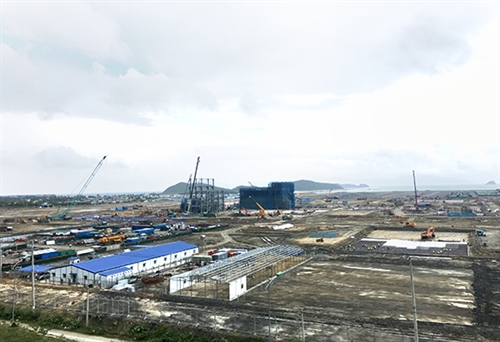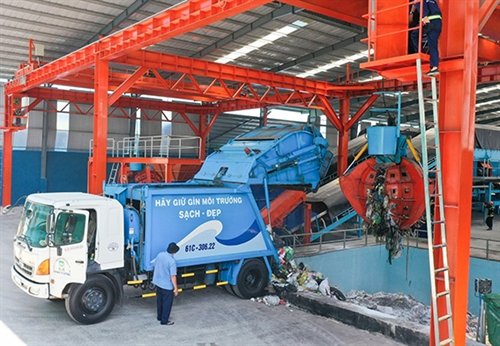Mai Hoang Thao
Hanoi Law University
Charge over future assets was first recognized in Government Decree 165/1999/ND-CP dated November 19, 1999, on secured transactions. Since then, charge over future assets has become more and more popular and show its important position in financial activities. This is the aim of this article to provide an overview about this special type of charges.
Assets that are considered future assets
Under Article 108.2 of Civil Code 91/2015/QH13 dated November 24, 2015 (the Civil Code) future assets include: (i) non-formed assets; and (ii) formed assets that the entity has established its/his/her ownership after the time of transaction establishment. This provision defines a future asset based on two factors: material factor (whether or not the asset has been formed in the material world) and legal factor (establishment of ownership). Accordingly, the basis for determining an asset as a future asset is the correlation between the formation/ownership status and the time of entering into the contract: if the contract which the asset is subjected to is created before the formation of the asset or the establishment of ownership, then the asset is a future asset.
Pursuant to Article 4.1 of Decree 21/2021/ND-CP dated March 19, 2021, guiding the Civil Code regarding secured transactions (Decree 21), in case a specialized law has specific provisions on security assets, establishment and implementation of security measures or enforcement security, such special provisions shall apply[1]. Currently, only the laws on real estate provide definitions of future assets. They are Law 266/2014/QH13 on Real Estate Business dated November 25, 2014 (Law on Real Estate Business), Housing Law 65/2014/QH13 dated November 25, 2014 (Housing Law), and Ministry of Justice Circular 07/2019/TT-BTP dated November 25, 2019, guiding registration for charge of land use rights and assets attached to land (Circular 07). Under these laws, future real estate includes:
- Houses under construction which have not yet been tested and commissioned for use. They may be: (i) future-acquired houses owned by organizations or individuals that purchase such houses under housing projects, or (ii) future-acquired houses that are constructed on parcels of land legally owned by organizations or individuals.
- Other construction works that are under construction and have not been tested and commissioned for use.
- Production forests being planted forests or perennial plants that are taking form or have taken form and are established by the chargor, with the ownership of the assets established by the chargor after the date on which the charge agreement is signed.
In case of land use rights, the legislators stated clearly in Article 10.4 of Decree 21 that “the use of future assets as security does not apply to land use rights”. The use of future land use rights as security is actually a matter of controversy. Pursuant to Articles 168 and 188.1.a of the 2013 Land Law, land use rights must be established in a certificate in order to become objects of transactions. Therefore, with land use rights concerning land plots that are allocated or leased by the State but have not been granted certificates (and the certification procedure takes a long time), credit institutions cannot accept them as security.
Future assets can only be charged, not pledged. It must be noted that Article 295.2 of the 2015 Civil Code stipulates that “security assets must be identifiable” and such is considered a validity condition of charge agreements. This condition may imply that in case a future asset is given as security, there must be solid grounds to determine that the ownership of such asset would be formed in the future. This understanding is in conformity with the practice of charge over future assets as well as the provisions of specialized laws on future assets.
There is no specific rule to define the basis for the formation of future assets, it depends on specific circumstances. For instance, in case of charge over future houses under an investment project on house construction, the grounds include the project file, approved technical design of the project, land use right certificate, and decision on land allocation or land lease of a competent state authority (Article 148.1.b of the Housing Law). In case of charge over a future machine, there must be a sale and purchase contract between the buyer (chargor) and seller. However, there is no ground that can completely assure the formation of the asset in the future, for example, it can no longer exist after land recovery by the State[2].
Article 24 of Decree 21 also states that “The secured party establishes its rights to part or all of the security asset being an asset to be formed in the future from the time that such part or the whole security asset is formed.” It can be inferred that a contract of charge over future assets only and actually comes into effect after the establishment of ownership. On the other hand, the main contract usually takes effect from the time when it is entered into. Because of these characteristics, charge over future assets contains more risks on the part of chargees.
 |
| Van Phong 1 power project in Van Phong economic zone, Khanh Hoa province, is under construction__ Photo: Thanh Van/VNA |
Taking charge over future assets
Movable assets
Common future movable assets given as security include cars, motorcycles, vehicles, fishing ships, machinery, equipment, production lines, materials, consumer goods, other goods, etc.
In case a security asset is a purchased asset, the purchase and taking charge of the asset will take place as follows: Initially, the buyer and creditor (usually a bank) enter into a credit contract. Subsequently, the bank issues a debenture, and with this debenture, the buyer and seller sign a sale and purchase contract for the product. Then, if the product needs to be registered in accordance with law (e.g., a car), the product will be registered under the buyer’s name. After that, the bank takes charge over the asset and registers the charge, then disburses the loan to the seller’s account. Lastly, the seller hands over the asset to the buyer. Under Article 161 of the 2015 Civil Code, in a sale and purchase contract, the time of ownership transfer is usually “the time of delivery of the possession of the asset”, not the time of entry into the sale and purchase contract or the time of asset registration. Thus, the charge created will attach to the asset as a future asset.
Goods rotated during the production or business process can also be considered future assets.
Immovable assets
Houses
Only credit institutions currently operating in Vietnam may take charge over future houses. Conditions for taking charge of a house in some specific cases are as follows:
First case: Charge over a future house under a housing project is taken by the project developer: The project file, approved technical design of the project, land use right certificate or decision on land allocation or land lease of a competent state authority; and the house to be charged must have had its foundation completed in accordance with the construction law.
The house to be charged must not be included in the part of the project or the whole project which has been charged by the developer[3]. The reason is that the project and house under the project are not two separate assets. Property rights are associated with the project. If these assets are allowed to be charged together, it will cause an overlap, and it is difficult to determine the value of the asset.
When the developer has charged the project or future houses and wants to sell these future houses to customers, the project must be released from charge, unless buyers and chargees agree that the charge does not have to be released (the agreement must be made in writing). The release must be in writing in the form of an agreement between the bank and the developer[4].
Second case: Charge over a future house under a housing project is taken by the purchaser of such house: The house purchase and sale contract signed with the developer; a document on assignment of the house purchase and sale contract (in the case of an assignee charging it); and a document proving that payment for the house has been made to the developer in accordance with the schedule agreed in the house purchase and sale contract.
Third case: Charge over a future house is taken by the organization or individual to construct such house in its/his lawful parcel of land: Documents proving legal residential land use rights in accordance with the land law; and a construction permit, if required.
State Bank of Vietnam’s Circular 26/2015/TT-NHNN dated December 9, 2015, guiding procedures for charging investment projects on house construction or houses to be formed in the future, and release of such charge, adds some conditions for future houses to be charged: There must be no dispute, complaint or legal proceedings related to the ownership/house purchase and sale contract; the house must not be subject to a land recovery decision, etc.
It is noteworthy that in many contracts on charge over land use rights, there may be a provision that “the security shall include every asset attached to land that will be formed on this parcel of land after the time of entering into the contract”. However, this provision may not be valid since the charge over a residential house requires conditions that probably have not been met at the time the contract is entered into.
Other construction works
Construction works other than houses may include: factories, hotels, prefabricated houses, frozen warehouses, transformer stations, swimming pools, flower greenhouses, parks, etc. Requirements imposed by banks in practice in the absence of statutory rules are quite similar to conditions for residential houses: Construction permit, one of various kinds of design drawings setting out the ground surface of the asset [work] attached to the land as approved by the competent authority, etc.
Property rights/Receivables
To be given as security, property rights must be: (i) related to no personal rights, and (ii) not banned from transaction. Property rights under Article 115 of the 2015 Civil Code comprise a large variety of rights. However, not many property rights can exist in the form of future assets, since property rights (in most circumstances) must arise from contracts. The creation of a contract depends much on the willingness of the parties and cannot be ascertained before the time of entering into the contract.
There is a kind of asset that can exist in future form, that is future receivables. Although future receivables have been mentioned by some legislations[5], there is still no legislation that gives a clear definition of future receivables and there are several opinions on this matter. However, it can be understood that a receivable is a future receivable if the underlying contract from which it arises has not been entered into. For example: With houses under housing projects that have not yet been sold to customers, developers can give future receivables (arising from future house sale and purchase contracts) as security. The chargees could determine conditions of the projects and housing demand in the segment that the developers are targeting, and so to decide whether they should take charges or not. Still, future receivables contain high risk that (i) there may be no receivables at all, in which case the charge contract will terminate under Article 422.5 of the Civil Code, and (ii) the value and certainty of receivables largely depend on the fate of the underlying contract.
Formal requirements and perfection
Pursuant to Article 119.2 of the Civil Code, to have legal validity, the charge must meet certain law-provided requirements: “where the law provides that a civil transaction must be in writing, notarized, certified [and/or] registered, such provisions must be complied with.” If the charge fails to comply with formal requirements, it will be considered invalid under Article 129 of the Civil Code.
When certain formal requirements are met, the charge becomes enforceable against the parties. However, the existence of a charge not only binds on the parties, but also on a third party that has an interest in the asset. Thus, a public notice should be made by the secured party to bring the security interest to the notice of subsequent purchasers or incumbrancers, or unsecured creditors. After the public notice is made, the security becomes “perfected”, which means the charge is effective against third parties.
Forms of charge contracts
The 2015 Civil Code does not lay any special requirements for charge in general. Therefore, a charge may be created “verbally, in writing or through specific acts”[6]. A law may set out further requirements. For instance, Article 188.3 of the Land Law provides that a charge over land use rights shall take effect at the time of its registration with a competent land use rights registration office. If there is no further requirement provided by law, a charge “shall be effective as from the time of entering into the contract” unless otherwise agreed by the parties (Article 319 of the 2015 Civil Code).
Notarization and authentication
In some specific circumstances, the law requires civil transactions to be notarized or authenticated. When not required by law, civil transactions may be notarized or authenticated if the parties choose to do so.
- A contract of charge over a future house must be notarized or authenticated (Article 122 of the Housing Law). In practice, many notary offices often refuse to notarize contracts of charge over future houses. Because a charge contract needs to satisfy many requirements specified in Circular 26[7], so the parties often choose to charge the property rights derived from the house sale and purchase contract. However, notary offices may have divergent views on this type of charge and the law is unclear in this regard. This also leads to difficulties and even refusal in notarizing and authenticating property rights derived from house sale and purchase contracts.
- A contract of charge over other (future) assets attached to the land use rights (Article 326 of the Civil Code) is not required to be notarized or authenticated since no law requires it.
Registration
Article 298.1 of the Civil Code stipulates: “Registration shall be a condition for validity of a secured transaction only when the law so provides.” In some cases such as charge over land use rights[8] or charge over future seagoing ships[9], a charge contract must be registered to be valid.
Except the above cases, registration is only a condition for the transaction to take effect against a third person. In other words, the absence of the registration may not affect the legal validity/bindingness on the parties to the charge contract.
Under Article 4.2 of Decree 102/2017/ND-CP dated September 1, 2020, on registration of security interests (Decree 102), charges over future assets are registered by request in the following cases:
“The following security measures may be registered on request:
(a) Charge over assets being other movable assets [other than those referred to in Clause 1 (ships and aircraft)];
(b) Charge over assets attached to land to be formed in the future.”
In case of charge over aircraft, it is a bit confusing since the charge must be registered under Article 4.1 of Decree 102, however, there is no law that expressly states that registration is a condition for validity of the charge.
Registration change
After the future asset is formed, registration change for the charge is required (Article 18.4 of Decree 102). If the security is an asset attached to land to be formed in the future (including house to be formed in the future) and such asset has been formed, then the procedures for registering the change must be carried out at the same time as those for certifying asset ownership in the single land certificate.
Note: Goods circulated in the process of production or business or motorized vehicles whose frame [chassis] numbers are declared upon the registration of the security measure do not need a change of registration. This is because it is so impractical to proceed such registration for goods circulation and the vehicles have already been registered under the buyers’ names even before the assets were handed to the buyers.
Enforcement
General procedures for enforcement of security, such as grounds of realization of security assets (Article 299 of the Civil Code), valuation of security assets (Article 306 of the Civil Code on valuation principles), etc., were applied to the enforcement of future assets.
Article 55 of Decree 21 allows the parties to negotiate options of enforcement and lays down some suggestions for enforcement of future assets:
First case: Assets have not yet been formed by the time of enforcement or assets have been formed but have not yet been granted a certificate of ownership in case the ownership registration is compulsory. Suggested methods for security enforcement are:
(i) Transferring asset purchase and sale contracts, and/or other contracts on the establishment of rights to future assets;
(ii) Receiving security assets in replacement of the performance of the secured obligation (appropriation of security assets); and,
(iii) Selling assets formed in the future in accordance with law.
Second case: Assets have completely been formed by the time of enforcement and the securing party has acquired ownership over them.
In this case, assets have become existing assets. There are two methods of enforcement in this circumstance:
(i) The secured party receives the security asset in replacement of the performance of the securing party’s obligation; and,
(ii) The security will be realized as existing assets.
Since Article 24 of Decree 21 also states that “The secured party establishes its rights to part or all of the security asset being an asset to be formed in the future from the time such part or the whole security asset is formed”, the chargor cannot enforce the security if the security assets have not been formed by the time of enforcement, or can enforce part of these assets only.
This provision is quite reasonable that the law lets parties decide on the best method (suitable to characteristics of assets and for the parties’ interests). In addition, suggestions are in accordance with general principles of security enforcement as well as particular provisions of specialized laws and have been applied by the parties in practice. For instance, in case of enforcement regarding a house that has not been formed or has been formed but has not yet been granted a certificate of ownership, methods of enforcement are: (i) transferring the future house sale and purchase contract, or (ii) (the credit institution) receiving the security asset in replacement of the performance of the secured obligation (appropriation).
Enforcement of receivables
Unfortunately, the current laws fail to specify how to enforce charge over receivables. Therefore, to reduce the risk, the parties may agree on enforcement methods as follows:
- If receivables fall due before the secured obligation: The account debtor is responsible for transferring the amount to an escrow account opened in the name of the chargee. This amount, together with the interest (if any), becomes security and will only be used to pay off the secured obligation upon maturity.
- If receivables fall due after the secured obligation: The chargee has the right to request the account debtor to pay the debt. The chargee may not request the obligor to pay when the debt is not due and payable, unless otherwise agreed.
Charge over future assets has played an important part in financial activities and probably will become more and more significant with the development of the economy. However, the law still lacks provisions for this special type of assets, and sometimes laws are inconsistent or overlapping. Of course the need for this type of security has arisen recently and this is a new practice. However, the law needs to be perfected in order to encourage those charges and hence to help boost credit.-









